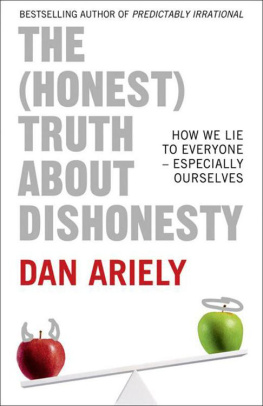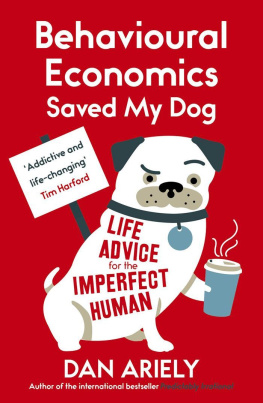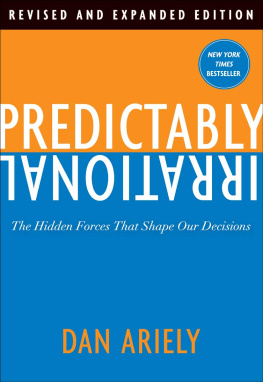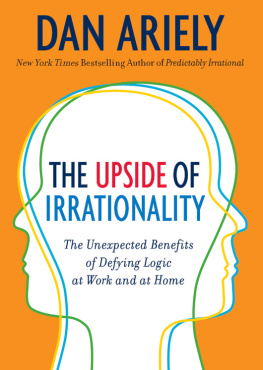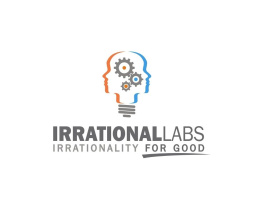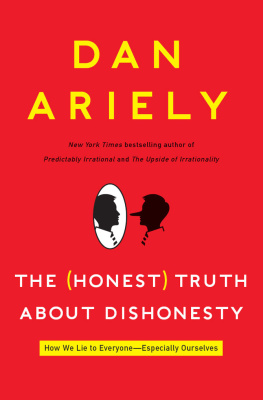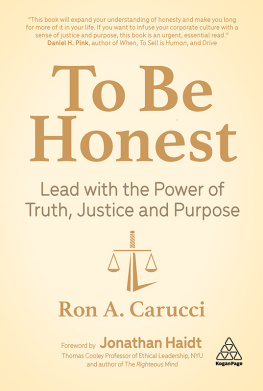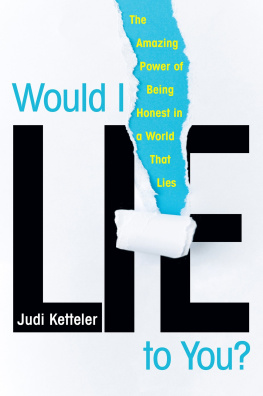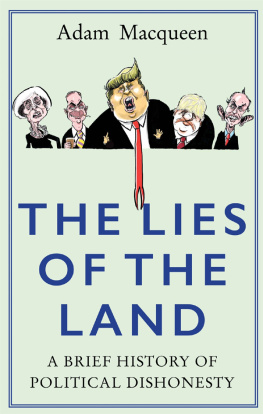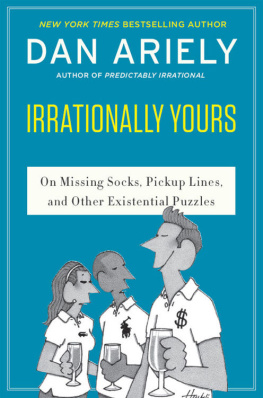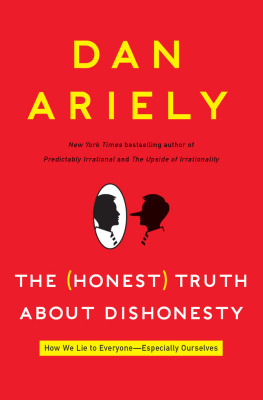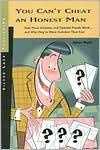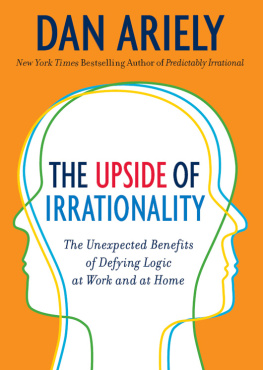

To my teachers, collaborators, and students,
for making research fun and exciting.
And to all the participants who took part in our
experiments over the yearsyou are the engine of this
research, and I am deeply grateful for all your help.
Contents
Why Is Dishonesty So Interesting?
From Enron to our own misbehaviors A fascination with cheating Beckers parking problem and the birth of rational crime Elderly volunteers and petty thieves Why behavioral economics and dishonesty?
Testing the Simple Model of Rational Crime (SMORC)
Get rich cheating Tempting people to cheat, the measure of dishonesty What we know versus what we think we know about dishonesty Cheating when we cant get caught Market vendors, cab drivers, and cheating the blind Fishing and tall tales Striking a balance between truth and cheating.
Fun with the Fudge Factor
Why some things are easier to steal than others How companies pave the way for dishonesty Token dishonesty How pledges, commandments, honor codes, and paying with cash can support honesty But lock your doors just the same And a bit about religion, the IRS, and insurance companies.
Golf
Man versus himself A four-inch lie Whether tis nobler in the mind to take the mulligan Schrdingers scorecard.
Blinded by Our Own Motivations
Craze lines, tattoos, and how conflicts of interest distort our perception How favors affect our choices Why full disclosure and other policies arent fully effective Imagining less conflicted compensation Disclosure and regulation are the answersor not.
Why We Blow It When Were Tired
Why we dont binge in the morning Willpower: another limited resource Judgment on an empty stomach How flexing our cognitive and moral muscles can make us more dishonest Self-depletion and a rational theory of temptation.
Why Wearing Fakes Makes Us Cheat More
The secret language of shoes From ermine to Armani and the importance of signaling Do knockoffs knock down our standards of honesty? Can gateway fibs lead to monster lies? When what the hell wreaks havoc Theres no such thing as one little white lie Halting the downward spiral.
Cheating Ourselves
Claws and peacock tails When answer keys tell us what we already knew Overly optimistic IQ scores The Center for Advanced Hindsight Being Kubrick War heroes and sports heroes who let us down Helping ourselves to a better self-image.
Creativity and Dishonesty: We Are All Storytellers
The tales we tell ourselves and how we create stories we can believe Why creative people are better liars Redrawing the lines until we see what we want When irritation spurs us onward How thinking creatively can get us into trouble.
Cheating as an Infection: How We Catch the Dishonesty Germ
Catching the cheating bug One bad apple really does spoil the barrel (unless that apple goes to the University of Pittsburgh) How ambiguous rules + group dynamics = cultures of cheating A possible road to ethical health.
Collaborative Cheating: Why Two Heads Arent Necessarily Better than One
Lessons from an ambiguous boss All eyes are on you: observation and cheating Working together to cheat more? Or keeping one another in line Cheating charitably Building trust and taking liberties Playing well with others.
A Semioptimistic Ending: People Dont Cheat Enough!
Cheer up! Why we should not be too depressed by this book True crime Cultural differences in dishonesty Politicians or bankers, who cheats more? How can we improve our moral health?
Why Is Dishonesty So Interesting?
Theres one way to find out if a man is honestask him.
If he says yes, he is a crook.
GROUCHO MARX
My interest in cheating was first ignited in 2002, just a few months after the collapse of Enron. I was spending the week at some technology-related conference, and one night over drinks I got to meet John Perry Barlow. I knew John as the erstwhile lyricist for the Grateful Dead, but during our chat I discovered that he had also been working as a consultant for a few companiesincluding Enron.
In case you werent paying attention in 2001, the basic story of the fall of the Wall Street darling went something like this: Through a series of creative accounting trickshelped along by the blind eye of consultants, rating agencies, the companys board, and the now-defunct accounting firm Arthur Andersen, Enron rose to great financial heights only to come crashing down when its actions could no longer be concealed. Stockholders lost their investments, retirement plans evaporated, thousands of employees lost their jobs, and the company went bankrupt.
While I was talking to John, I was especially interested in his description of his own wishful blindness. Even though he consulted for Enron while the company was rapidly spinning out of control, he said he hadnt seen anything sinister going on. In fact, he had fully bought into the worldview that Enron was an innovative leader of the new economy right up until the moment the story was all over the headlines. Even more surprising, he also told me that once the information was out, he could not believe that he failed to see the signs all along. That gave me pause. Before talking to John, I assumed that the Enron disaster had basically been caused by its three sinister C-level architects (Jeffrey Skilling, Kenneth Lay, and Andrew Fastow), who together had planned and executed a large-scale accounting scheme. But here I was sitting with this guy, whom I liked and admired, who had his own story of involvement with Enron, which was one of wishful blindnessnot one of deliberate dishonesty.
It was, of course, possible that John and everyone else involved with Enron were deeply corrupt, but I began to think that there may have been a different type of dishonesty at workone that relates more to wishful blindness and is practiced by people like John, you, and me. I started wondering if the problem of dishonesty goes deeper than just a few bad apples and if this kind of wishful blindness takes place in other companies as well. friends and I would have behaved similarly if we had been the ones consulting for Enron.
I became fascinated by the subject of cheating and dishonesty. Where does it come from? What is the human capacity for both honesty and dishonesty? And, perhaps most important, is dishonesty largely restricted to a few bad apples, or is it a more widespread problem? I realized that the answer to this last question might dramatically change how we should try to deal with dishonesty: that is, if only a few bad apples are responsible for most of the cheating in the world, we might easily be able to remedy the problem. Human resources departments could screen for cheaters during the hiring process or they could streamline the procedure for getting rid of people who prove to be dishonest over time. But if the problem is not confined to a few outliers, that would mean that anyone could behave dishonestly at work and at homeyou and I included. And if we all have the potential to be somewhat criminal, it is crucially important that we first understand how dishonesty operates and then figure out ways to contain and control this aspect of our nature.
WHAT DO WE know about the causes of dishonesty? In rational economics, the prevailing notion of cheating comes from the University of Chicago economist Gary Becker, a Nobel laureate who suggested that people commit crimes based on a rational analysis of each situation. As Tim Harford describes in his book The Logic of Life , was quite mundane. One day, Becker was running late for a meeting and, thanks to a scarcity of legal parking, decided to park illegally and risk a ticket. Becker contemplated his own thought process in this situation and noted that his decision had been entirely a matter of weighing the conceivable costbeing caught, fined, and possibly towedagainst the benefit of getting to the meeting in time. He also noted that in weighing the costs versus the benefits, there was no place for consideration of right or wrong; it was simply about the comparison of possible positive and negative outcomes.

